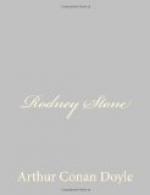But my uncle was paying no attention whatever to the voluble self-reproaches of the landlord. He had opened the note, and was reading it with a slight raising of the eyebrows, which was almost the very highest note in his limited emotional gamut.
“What make you of this, nephew?” he asked, handing it to me.
This was what I read —
“Sir Charles Tregellis,
“For God’s sake, come at once, when this reaches you, to Cliffe Royal, and tarry as little as possible upon the way. You will see me there, and you will hear much which concerns you deeply. I pray you to come as soon as may be; and until then I remain him whom you knew as
“James Harrison.”
“Well, nephew?” asked my uncle.
“Why, sir, I cannot tell what it may mean.”
“Who gave it to you, sirrah?”
“It was young Jim Harrison himself, sir,” said the landlord, “though indeed I scarce knew him at first, for he looked like his own ghost. He was so eager that it should reach you that he would not leave me until the horse was harnessed and I started upon my way. There was one note for you and one for Sir Lothian Hume, and I wish to God he had chosen a better messenger!”
“This is a mystery indeed,” said my uncle, bending his brows over the note. “What should he be doing at that house of ill-omen? And why does he sign himself ‘him whom you knew as Jim Harrison?’ By what other style should I know him? Harrison, you can throw a light upon this. You, Mrs. Harrison; I see by your face that you understand it.”
“Maybe we do, Sir Charles; but we are plain folk, my Jack and I, and we go as far as we see our way, and when we don’t see our way any longer, we just stop. We’ve been goin’ this twenty year, but now we’ll draw aside and let our betters get to the front; so if you wish to find what that note means, I can only advise you to do what you are asked, and to drive over to Cliffe Royal, where you will find out.”
My uncle put the note into his pocket.
“I don’t move until I have seen you safely in the hands of the surgeon, Harrison.”
“Never mind for me, sir. The missus and me can drive down to Crawley in the gig, and a yard of stickin’ plaster and a raw steak will soon set me to rights.”
But my uncle was by no means to be persuaded, and he drove the pair into Crawley, where the smith was left under the charge of his wife in the very best quarters which money could procure. Then, after a hasty luncheon, we turned the mares’ heads for the south.
“This ends my connection with the ring, nephew,” said my uncle. “I perceive that there is no possible means by which it can be kept pure from roguery. I have been cheated and befooled; but a man learns wisdom at last, and never again do I give countenance to a prize-fight.”




